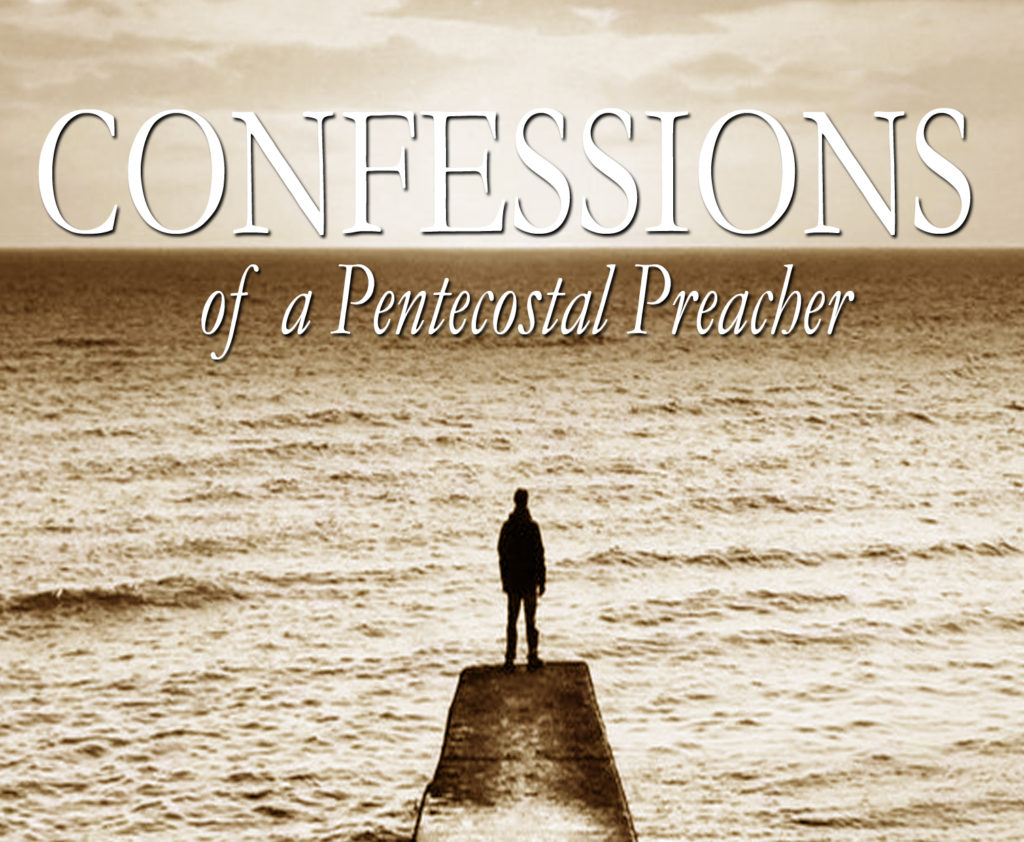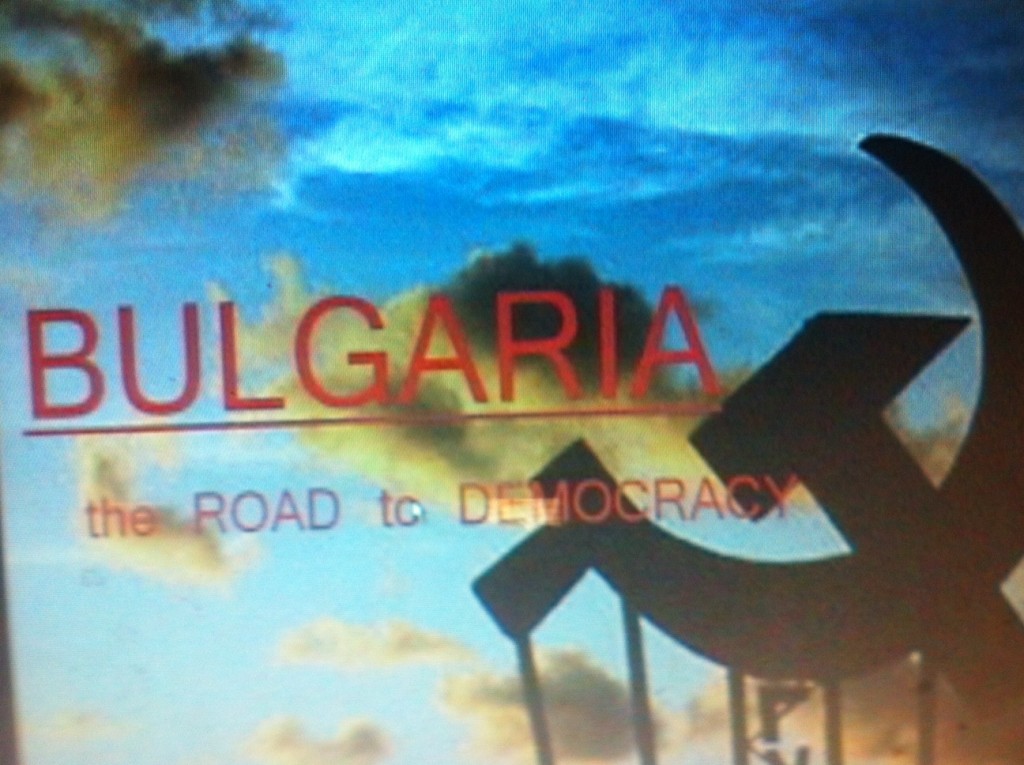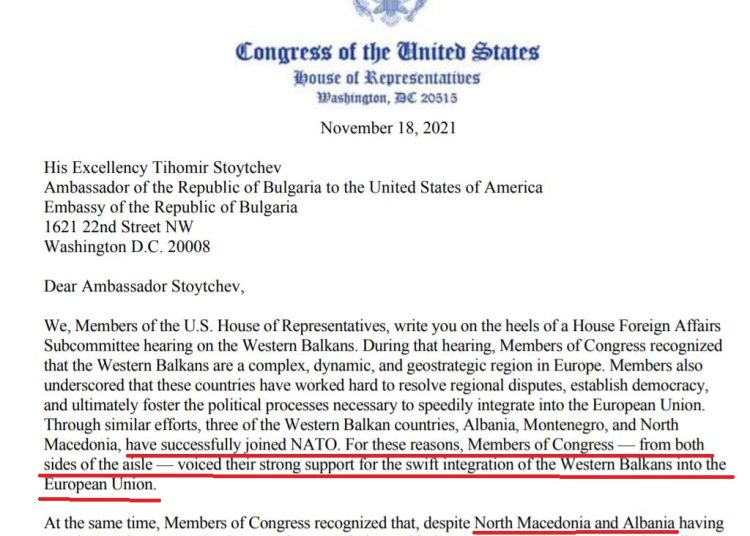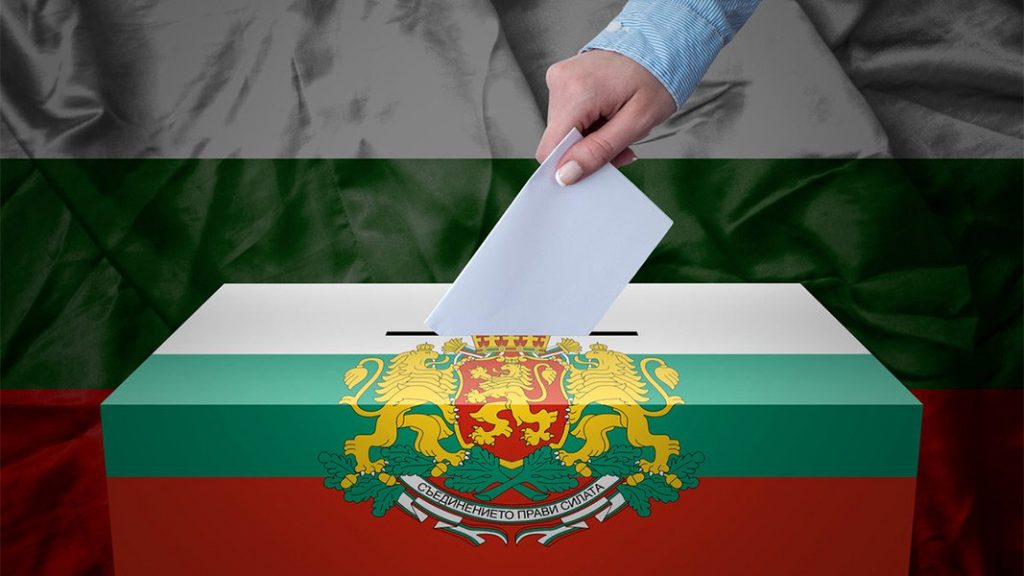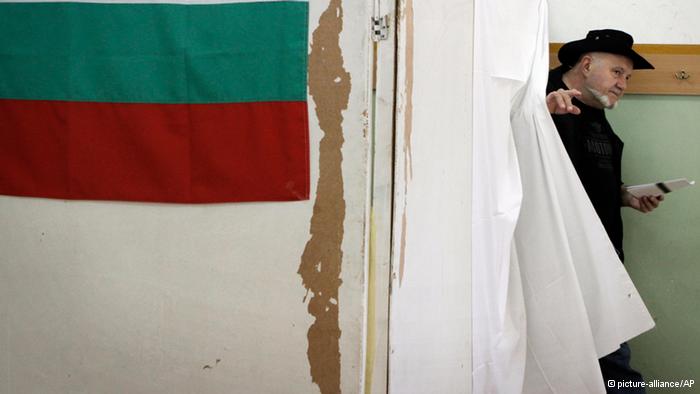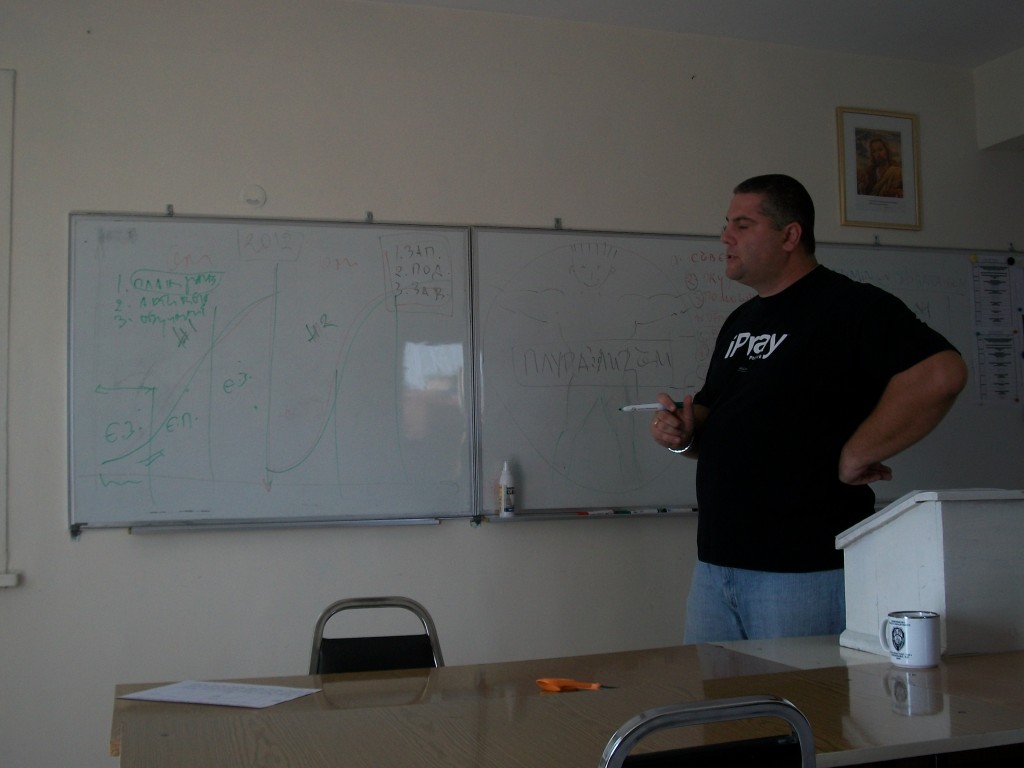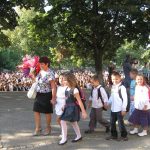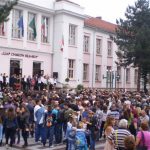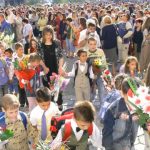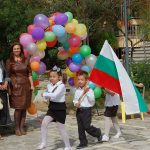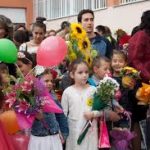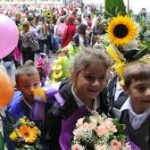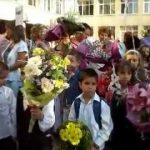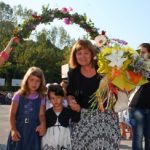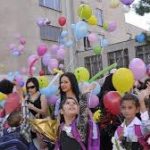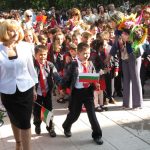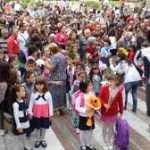The Central Church of God Ministry Center in Sofia (Bulgaria) Today
At the end of each year, we have made it a tradition to share the projects completed in the past months of hard work and labor for the Kingdom. But as we are approaching now 20 years of ministering and teaching with the Church of God denomination together, we have decided to recall some more long-term projects.
Exactly 20 years ago, my wife landed in Sofia, Bulgaria for the first time on a snowy December day. In fact, it was so cold that my mother worrying she would be coming from a much warmer subtropical climate, bought the biggest winter jacket she could find, so we could wrap her with it on the way from the airport. Not the most glorious meeting or welcome party as I recall it today.
I was eager to show her my Church, the Bulgarian Church of God, then second to none in the country with 32,000 membership strong and 400 congregations. Many of them newly started and 28 of them in the two-million people capital alone. The Central Church of God in Sofia, where I preached and ministered in 2001-02, had almost 1,200 people at that time. Its main meeting place was the multifaceted Church of God Ministry Center in a prime location in the growing European capital – a project we had undertaken in 1998 with the faithful will and support of some two dozen Church of God congregations from Florida. The documents from my personal archives tell the story best:
December 2, 2001 – I had just returned from Romania bringing with me World Missions Director Lovell Carry and Field Director (Central/Eastern EU/CIS) Dieter Knospe. They were in Bulgaria on a special visit to transfer the new building to the ownership and operation of the Central Church of God in Sofia per the contract signed with our overseer in the Spring of 2001.
The days of Ministry Weeks 17-19 that followed in December, 2001 and which my wife recorded here: https://cupandcross.com/2001/12/ are excruciating to even remember today. Sunday service with Sunday School and preaching, then again on Tuesday, Wednesday and Thursday. Then special Saturday services in Pravetz and many other places. Similar schedule plus the traditional celebration services in the following Christmas week. Repeat again for the New Year’s week. And all of these done in extremely cold weather and tons of snow on the ground – so much that my wife was delayed for days leaving for the States mid-January with all flights out of Sofia cancelled as the ice never melted enough to clear the runway and defrost the airplanes.
And all through this, the building never stopped. Regardless of all difficulties, we were all working eagerly and anticipating greater results. The multifaceted Church of God Center in downtown Sofia was to encapsulate all our ministries and many more, giving our young freedom generation the opportunity of a lifetime to make a difference for the Kingdom…
Today, when the building of our Ministry Center is being sold and it will be used for something the will of the donors never intended it to be, our Church of God denomination in Bulgaria is split to no less than 12 fractions all registered since 2005. All of them still carry a variant of the Church of God name and consist of the same people I grew up with under the Communist Regime of Bulgaria. We were promised a democratic leadership formed by indigenous people, but instead ended up with mini-bosses, regional micromanaging oversight, multiple splits and everything that characterizes a very typical colonial type of missions.
With the church organizations split time and again until torn into pieces, many of my peers chose alternative paths. Some left the ministry, others were hurt or divorced, a few even died and many simply gave up and moved on. With the rest, I have an appointment at the End of the World!
But none of this gives any pleasure or satisfaction to share. Especially when reminded that the dreams we all once dreamed are now hang on the willow trees by the rivers of Babylon. When reaching those waters of deeply troubled cross-cultural crises of faith and conviction, all bridges to people have sunken with no hope to recover again. God’s Kingdom has no gain in any of this!
Our prayer has hence turned into a prophetic protest for a new reality – not merely for a new mission paradigm, but one of a whole new mission… A Spirit-led ministry that forgoes all man-made politics and business-like models, but instead aims to build a New Church that is nothing less than the very cross-road where we encounter God and others in the Spirit of Pentecost.
CONFESSIONS of a Pentecostal Preacher
To Mark Alan
We know not why good people have to die,
but we do know we must tell their story…
Chapter I: Beyond the Church and into God
Be without fear in the face of your enemies.
Be brave and upright that God may love thee.
Speak the truth always, even if it leads to your death.
Safeguard the helpless and do no wrong.
That is your oath.
~Kingdom of Heaven (2005)
Separation of church from politics of false religiosity
The phone rang heavy and long. It was 4 AM in Bulgaria, but I was already up. A friend on the other end of the line was calling from South Carolina with a warning of some bad situation. The following morning, I was going to be contacted by the Director questioning why we were ministering in churches outside of our denomination.
The truth was we had ministered in some 300 local churches across the Balkan country of Bulgaria crossing all denominational boundaries and gathering youth from just about every confession. God had used us not only to reach and minister and to lead, but to step into an untouched spiritual realm, to undertake an unfamiliar ministry paradigm and to approach a brand new dimension of reality where He was to be the center of it all. And we had obeyed without questions. Now it was time to pay the price!
* * *
Our denomination, the one to which I remain both critically loyal and loyally critical, spreads over some five generations. Through its century old existence, the struggles and tension between theology and praxis has been in the center. And there, in the very essence of Pentecostalism itself, while some are always celebrating and being celebrated in the office or temple, others are always pushed in the periphery of normal life, hidden from the world behind closed doors and seeking a much deeper experience with God.
These modern day mystics are not only forgotten, but often forbidden. For their riot for righteousness cannot be conceived, contained and controlled by the religious norms of organized officiality. They speak as prophets to a world they so fervently try to escape from, about a reality that does not exist in the normal believer’s mindset. A stage of spirituality that cannot be preached without being lived in the social existence. And a relationship of God that goes far beyond common relationism and into God himself. That God, Who does not abide in offices and temples, but on the cross outside of the city walls…
But I knew nothing of this until that cold winter morning when the phone rang through darkness of the night. Knowing what is coming, rarely changes what we have done to get here.
7 Years in Bulgaria: CONFESSIONS of a Pentecostal Preacher
by Dony K. Donev, D.Min.
Upcoming Releases for United States (October, 2020)
BULGARIA has a NEW Government! For Now…
SOFIA, Bulgaria – After three National Parliament elections held in 2021 alone and three acting temporary cabinets, Bulgaria now has a new government based on a 4-partisan coalition. Will it outlast its first 100 days? ONLY GOD KNOWS!
Bulgaria’s PM Designate Petkov Presents New Government Ahead of Parliament Vote
Bulgarian Prime Minister designate Kiril Petkov presented the composition of his future government to the nation as he seeks to end eight months of political deadlock. Petkov, 41, leader of the newly formed centrist party We Continue the Change (PP), reached an agreement a day earlier with three other left-wing and center-right groups to form a coalition government.
Petkov’s party will hold 10 of the 21 ministerial positions, including prime minister and two deputy prime minister posts. The four-party coalition will control 134 seats in Bulgaria’s 240-seat parliament, which is set to vote on approving the new government on December 13. Petkov, whose party came in first on an anti-graft platform, told media on December 11 that the future government will have “zero tolerance” for corruption and said one of his first priorities will be to reform the Anti-Corruption Commission.
The new coalition is expected to have a majority of 134 lawmakers in the 240-seat parliament. “The agreement is 140 pages and details all policies. It gives the chance for the coalition to be strong and work for a long time,” Petkov told the national BNR radio after the party signed the document with each of its partners separately.
SUPPORTING PARTIES:
- Bulgarian Socialist Party (socialist democrats)
- There is Such People (centrist democrats)
- Democratic Bulgaria (democrats)
Present 227 out of 240 MPs registered in the plenary hall. Instead of presenting Kiril Petkov’s candidacy, the plenary day began with a declaration on behalf of the GERB-SDS group, which will not support the draft cabinet.
“You organized brutal repression in the persecution of political opponents,” Desislava Atanasova said. She accused the president of undermining democracy.
The New Cabinet: “Vazrazhdane” will Not Support the “Petkov” Cabinet
The parliamentary group of “Vazrazhdane” will not support the draft cabinet “Petkov”, because according to its leader Kostadin Kostadinov the policies are a continuation of the GERB government, and the impression was that it the cabinet was created in foreign embassies
The New Cabinet: DPS will Not Support the “Petkov” Government
The Movement for Rights and Freedoms (DPS) will not support the proposed program, structure and composition of the Council of Ministers, because it has participated in the talks about them. This was announced by DPS leader Mustafa Karadayi. According to him, the Movement will be a constructive opposition and will contribute to solving problems and protecting rights and freedoms.
Bulgaria Set for Yet Another Election in the Spring of 2022
Current Socialist Bulgarian President won a second term with the overwhelming support of President Biden. However, during the election debates, President Radev slipped and claimed the Ukrainian Crimea belonged to Russia. By the time the election results were finalized on Monday, both the European Union and the U.S. Embassy in Bulgaria issued notes of warning stating that, Crimea is part of the Ukraine and is currently under Russian occupation. Also on Monday, U.S. Congress forwarded a letter to the Bulgarian government for an immediate decision on the acceptance of Macedonia in the European Union.
These escalations occur in the midst of Bulgaria unable to form a government after three consecutive elections in 2021. As it is highly improbable the current election winner with only 26% will be able to form a government without a political majority, another election may be on the horizon of 2022.
Apart from the Crimean and Macedonian questions, the next Bulgarian government has committed to President Biden’s tri-sea initiative leading to most drastic political restructuring as follows:
1. Accepting the cross-gender Istanbul Convention
2. Pushing Bulgaria toward military involvement in the Crimean Crises
3. Opening Bulgaria as a regional big-pharma hub for modern vaccine testing
Changes in the Bulgarian Constitution may push the country from Parliamentarian to a Presidential republic alike the Russian model set by Putin’s “democracy.” But before all this happens, an actual government will have to be formed in the midst of a very cold winter with rising gas prices and electricity prices already increased by some 30%. Drained by the 2020 pandemic and with no government help or any tax break, the evangelical churches in Bulgaria are not prepared for any of these new challenges.
Third National Elections for 2021 in Bulgaria
November 10, 2021 by Cup&Cross
Filed under Featured, News, Publication
This weekend, Bulgaria is holding another, third national elections for 2021. This one has a double outcome – new parliament and a new president. After not being able to form a government in the first two elections for 2021, the country is heading to a major political storm within the growing pandemic. Apart from struggling economically with other EU countries, Bulgaria is currently leading with death cases due to COVID and the temporary acting government has been hopelessly drifting between strong restriction measures of virtually all business and gatherings or a complete lock-down for weeks at the time. None of these has brought any desired results.
On the contrary, virtually all evangelical churches are struggling to respond to the needs of their congregations pressed between the harsh restrictions and keeping the lights on as commercial electricity cost has increased over 33% this year alone. While the Eastern Orthodox church in Bulgaria is subsidized with some $10-25 million and the Muslim confession with $3 million, the evangelical churches are only hoping to get some grants after this year’s national census is counted. By accepting state subsidy, however, religious groups in Bulgaria are entering a season of dependence on secular government. For the evangelicals this means:
- Churches and ministers must declare all foreign currency money flow and foreign bank accounts
- Participation of foreign persons in the administration of any denomination is strictly forbidden
- Foreign parsons shall not be allowed to speak at religious meetings in any way shape or form especially religious sermons
- Anonymous donations and donorship to religious organization is not permitted
- Bulgarian flag shall be present in every temple of worship
- The new measure will block all foreign interference in the faith confessions and denominations in Bulgaria
As if all this is not enough, just a week before the elections it was revealed that the electronic vote this time will be done on voting machines purchased from nowhere else but Venezuela. Over 400 such machines have been brought into the country without registration “for spare parts,” which brings even more confusion and suspicion to the already fragile election process that has occurred in Bulgaria almost every year since 2005.
Government Elections in Bulgaria (2005-2022):
2005 Parliamentary Elections
2006 Presidential Elections
2007 Municipal Elections
2009 Parliamentary Elections
2009 European Parliament elections
2011 Presidential Elections
2011 Local Elections
2013 Early parliamentary elections
2014 Early Parliamentary Elections
2015 Municipal Elections
2016 Presidential election
2017 Parliamentary elections
2019 European Parliament election (23-26 May)
2019 Bulgarian local elections
2019 Municipal Elections
2021 March National Parliament election
2021 Second National Parliament election
2021 Third National Parliament and Presidential elections
Bulgaria: What to Watch for in the November 14 Elections
Although the third for the year, on November 14 for the first time the elections will be 2 in 1 – for president and MPs. The vote is taking place at the peak of the fourth wave of coronavirus in Bulgaria and anti-epidemic measures will again be observed, and the number of those who voted with a mobile ballot box will be clear on election day.
For the second time, the voting in the sections with 300 and more voters will be only with machines, but for both votes the voting procedure will be with one device, and it will be necessary to indicate what to vote for and wait for the printing of two receipts. Therefore, it is expected that the process will be slower, and if the cases of patients in the coming days increase – this will affect the turnout.
In front of the voters
The third election of the year will be held at the peak of the fourth wave of the coronavirus epidemic, which may be a cause for concern among some eligible voters. For now, there will be no stricter anti-epidemic measures in the polling stations and they will remain known until now – wearing masks, disinfection, distance and frequent ventilation in the premises. From the previous two votes it cannot be concluded that the incidence will be denied by voters, as on April 4, when the peak of the third wave was, voter turnout was 50.61%, while on July 11, when there were few registered cases – only 42.19% .
Quarantined voters will be able to ask to vote with a mobile ballot box at the address where they are isolated, even on election day. It would be an obstacle if by the day of the vote in a given settlement there is no section for quarantined, as a condition to have only 10 applications submitted before. However, the Central Election Commission did not know whether it would be possible to open so many quarantined sections in recent weeks.
For the first time this year, the elections will be 2 in 1 – for president and MPs, which could lead to delays and queues in some sections. In the sections with 300 and more voters, the voting is only with machines, and the voting time is expected to be 5 minutes again.
There are two points that a voter using a device should be aware of. The first is at the beginning, when the machine asks which type of election the voter wants to vote for and whether for both – he/she can mark once and by continuing, confirm, after which he/she has no right to correction. The second is when printing the segments with the choice at the end – if the voter has exercised his/her right to vote in both votes, he/she must wait for the machine to print two receipts – one short and one longer, and pull them out after hearing a beep. If it does so while printing, the machine may lock.
The voter will also have a problem if he/she decides to take pictures of how they vote, as the recording of the vote is prohibited and the sanction is BGN 1,000.
Possible problems for the election commissions
There seem to be two main challenges for sectional election commissions – one is related to the machines and the other is to the counting of the voting receipts.
The problems with the machines can be of different nature – technical malfunctions, errors in the lists as on April 4 in Veliko Tarnovo, when there were exchanged names and numbers in one of the candidate lists, errors in cleaning, which can only be done with alcohol, etc. . A technician will be available, but if the fault is not rectified, a paper ballot will be put to the vote following a decision by the district or central commission.
Difficulty and delays in reporting the results would be caused by the decision to count all machine voting receipts, which were taken by the Central Election Commission but revoked by the Supreme Administrative Court. The commission should now determine in how many and in which sections the control receipts should be counted, and the result will be taken from the protocol printed by the machine, and the result of the control count will not be entered in the protocol.
However, the count will slow down the section commissions where it is done. After the end of the election day, the commissions will have to open the box with the receipts, divide into two piles those for the presidential and those for the parliamentary vote and then count, without taking into account the preferences for MPs. According to experts, voluntary or unintentional human errors are possible during the counting, as well as manipulations by destroying part of the receipts. This will certainly delay the transmission of the results to the district election commissions.
Pentecostal Education in Bulgaria Two Decades Later
This article was originally authored in 2008 and now addresses issue that have been ongoing for over 20 years
The missionary strategy of Protestant denominations toward Bulgaria within the 19th century effectively included evangelistic, publishing and educational outreaches. The educational paradigms, which the western missionaries introduced, were soon adopted by the Bulgarian people, quickly realized as progressive and successfully implemented in both religious and secular Bulgarian schools. These trends continued in the next several decades, educating Bulgarian youth and producing the first generation of Bulgarian leaders who took their rightful place in political, economical, social and religious structures in the Bulgarian lands.
Unfortunately, when the Communist Revolution took place in Bulgaria, all religious schools, with the exception of the Eastern Orthodox Seminary in Sofia, were closed down and religious education was outlawed. For the next half century, Bulgarian evangelical ministers were destined to do ministry without any former religious education.
When the Berlin Wall fell in 1989, the tension for religious education reached its culmination and a number of religious schools were quickly established across Bulgaria. The instruction methods used ranged from Bible study home groups to Bible colleges all to fulfill the niche for religious education. Two important milestones must be mentioned here, and they are the opening of the Logos Bible Academy in the Danube town of Russe and the starting of a long distance program by ORA International.
Naturally, the general trend of Bulgaria’s post communist governments to control these educational institutions resulted in the registration of a religious institute under the Directorate of Religious Affairs, a government agency formed to register, manage and supervise the activity of religious formation on the territory of Bulgaria. It was in this context that the Bulgarian Evangelical Theological Institute (BETI) was formed and registered in the capital Sofia. It included five departments (often called faculties), representing Bulgarian evangelical denominations with a predominant focus on the Pentecostal wing.
The Theological College in Stara Zagora, often mistakenly called a Theological Seminary, was established in 1998 as one of these departments to represent the Bulgarian Church of God. Because of current developments within the Bulgarian Church of God, the department was started in the city of Stara Zagora, located some four hours east of the capital and became the only of the faculties not located in Sofia. Naturally, its location, staff, affiliation and purpose created a sense of independence, both in its theology and structure.
With the acceptance of the new Act of Confessions in 2002, the Bulgarian government employed a more drastic approach toward all religious institutions not fitting the standard denominational profile. Since BETI was among them, the government initiated the process of the Institute’s accreditation with the Ministry of Education. Five years later, the government is yet to grant the accreditation. It was not until the publication of this article in March, 2008 that the Bulgarian Government moved toward finalizing the long-awaited accreditation of BETI.
Meanwhile the Institute’s management is facing a tri-dimensional dilemma which includes economic, cultural and leadership tensions. Some of them have not been resolved due to the lack of recourses; others have not been resolved due to the lack of essential prerequisites in the long-term educational strategy of the school. The following is a list of the challenges, which must be resolved immediately in order for the Institute to continue to operate under the said government accreditation:
1. The school’s baccalaureate program, structured primarily after 20th century American Bible college model, is practically incompatible with the requirements of the Bulgarian Ministry of Education. The dilemma of changing the program to meet the accreditation requirements or to retain the school’s evangelical identity is yet to be resolved on part of BETI as a whole, as well as its theological departments individually.
2. Three masters programs that were to focus on the subjects of Christian counseling, chaplaincy ministry and missions were secured from the Bulgarian government several years ago. However, because of the lack of students and experts on the said topics, only one of them, the master’s program in counseling, has been partially developed. Today, it remains in its initial phase as a distance-learning program, while the other two programs are virtually untouched.
3. It has taken BETI over a decade to comply with the country’s requirements for higher education. In this process, the school has not facilitated the opportunity for religious master’s programs thus missing its mission to become a higher education authority in religious studies.
4. The resistance toward the evangelical movement and more specifically its presence within the educational process of Bulgarian adolescents has resulted in continuous protests on part of the Bulgarian community. They have been followed by restrictions from the government, which has forced the Institute at the periphery of the educational process. Two waves of attacks against Bulgarian evangelicals in 1990-1993, 2002-2004 and the current trend of the government to establish mandatory religious classes for children ages seven to twelve has contributed to this alienation and has forced the inability of evangelical education to find and establish its place within the Bulgaria community. Much of this has to do with the lack of an adequate placement strategy for graduates upon the completion of the college’s program.
5. Furthermore, scholarships for individual students and sponsorship for the colleges of the Institute has weekend since 9/11 creating an economical dilemma with which the Institute is still struggling. The financial crisis has brought about the rethinking of the economic strategy of the Institute, its dependency on religious support sources and its financial self-sufficiency.
6. Additionally, a number of Roma/Gipsy communities have received substantial educational grants from the European Union upon Bulgaria’s official membership. This has taken a great number of the Roma/Gipsy students within the Institute in a different direction.
7. Immigration has also taken its toll on the Institute’s graduates, as many of them have seized the opportunity to continue their training in religious educational institutions abroad, while other have simple forgone their higher religious education in the struggle for personal survival, both groups never to return and practice in Bulgaria.
8. It is also unfortunate, that most of the professionally trained Bulgarians who have graduated with a higher degree in religious studies from foreign colleges and universities, have been unable to find their place within the structure of the BETI and have been employed in educational institutions, religious centers, ministries and missions which often have to do very little with Bulgaria.
9. The denominational affiliation of each of the departments, has contributed to the dilemma of structural incompatibility with the leadership and vision differences between the denominations that are affiliated with the Institute. The recent crises in several of the member dominations have added to the escalation of the above dilemmas and the incapability for the resolution from a denominational standpoint.
10. Naturally, the well-educated graduates have chosen not to occupy themselves with denominational politics both to avoid confrontation and to express their disagreement. This dynamic has been partially ignored by leadership remaining from the period of the underground church when religious education was virtually nonexistent and lacking a complete realization of the power of education. This unnoticed trend, however, endangers Bulgarian Evangelism creating a lack of continuity within the leadership and preparing the context for the emerging leadership crises.
As an educational institution of the Bulgarian Church of God and a member of the Bulgarian Evangelical Theological Institute, the Theological College in Stara Zagora has experienced all of the above dilemmas and more. Its physical distance from the capital Sofia has jeopardized its accreditation with Bulgaria’s Ministry of Education, the latest guidelines of which have constituted that a school department cannot be more than 25 miles away from its main office. Since Stara Zagora is almost 200 miles away, the Church of God Bible College has been forced to find a suitable alternative. One logical solution may be to move the school or parts of the school to a Sofia location.
However, the Stara Zagora Theological College has had very little if any representation in the capital for its decade of existence. A move to Sofia would propose a number of new problems such as the relocation of teachers and a forced split of focus between two campuses. Another immediate challenge would be the development of a long-term financial strategy to meet a budget, which in the capital would be three-four times the cost of the same operation in the city Stara Zagora. And finally, a successful strategy for establishing a new level of cooperation with the rest of the Institute’s departments, which have operated in the capital Sofia for over a decade is a must, before a successful educational program can be initiated by the Bulgarian Theological College at the new location.
Global Network of Bulgarian Evangelical Churches outside of Bulgaria (2021 Report)
 Bulgarian Evangelical Churches in the European Union (2019)
Bulgarian Evangelical Churches in the European Union (2019)
- Bulgarian Evangelical Churches in Germany
- Bulgarian Evangelical Churches in Spain
- Bulgarian Evangelical Churches in England
- Bulgarian Evangelical Churches in France
- Bulgarian Evangelical Churches in Belgium
- Bulgarian Evangelical Churches in Italy
- Bulgarian Evangelical Churches in Cyprus
- Bulgarian Evangelical Churches in Crete
Bulgarian Evangelical Churches in America (2019 Report)
- Bulgarian Evangelical Churches in Chicago (2019 Report)
- Bulgarian Evangelical Churches in Texas (2019 Report)
- Bulgarian Evangelical Churches – West Coast (2019 Report)
- Atlanta (active since 1996)
- Los Angeles (occasional/outreach of the Foursquare Church – Mission Hills, CA)
- Las Vegas (outreach of the Foursquare Church – http://lasvegaschurch.tv)
- San Francisco (occasional/inactive since 2012, Berkeley University/Concord, CA)
Bulgarian Evangelical Churches in Canada (2019 Report)
- Toronto (inactive since 2007)
- Toronto/Slavic (active since 2009)
- Montreal (occasional/inactive since 2012)
CURRENTLY INACTIVE CHURCHES/CONGREGATIONS:
- New York, NY (currently inactive)
- Buffalo, NY (occasional/inactive)
- Jacksonville, FL (occasional/inactive since 2014)
- Ft. Lauderdale / Miami (currently inactive)
- Washington State, Seattle area (currently inactive)
- Minneapolis, MN (occasional/inactive since 2015)
READ MORE:
- First Bulgarian Church in Chicago Opened in 1907
- Gateway Cities for Bulgarian Evangelical Churches
- How to Start a Bulgarian Church in America from A-to-Z
- Unrealized Spiritual Harvest as a Paradigm for Cross-Cultural Ministries among Migrant and Disfranchised Ethnic Groups in America Today
BULGARIA represented with 5 lemmata in the printed BEGP
Brill’s Encyclopedia of Global Pentecostalism (BEGP) provides a comprehensive overview of worldwide Pentecostalism from a range of disciplinary perspectives. It offers analysis at the level of specific countries and regions, historical figures, movements and organizations, and particular topics and themes. The published volume is now available along with the online version of the Encyclopedia
Bulgaria set for third election this year in November
Protest party ITN edged out the conservative GERB in the latest vote, but was not able to form a government. Bulgarian President Rumen Radev will also be running for reelection. Bulgaria will hold its third parliamentary election since April on November 14, President Rumen Radev announced Saturday. Following months of deadlock, Bulgarians are set to once again choose a new parliament after neither of the three largest parties was able to secure a majority government after an election in July. On Saturday, Radev announced that presidential elections will be held on the same day to save money. He is hoping to secure his second term in November.
President Biden delivers remarks at Bulgaria’s Three Sea’s initiative, which aims to reinforce ties between countries along the borders of the Baltic, Adriatic, and Black Seas.
Who is predicted to win?
Protest party ITN, that emerged from mass demonstrations against corruption in 2020, won the July election but was not able to secure a majority in parliament.
 Anti-corruption protests in the summer of 2020 led to the creation of a protest led by an entertainer
Anti-corruption protests in the summer of 2020 led to the creation of a protest led by an entertainer
The latest polls indicate a similarly inconclusive race ahead of the November election.
The pro-EU, centre-right party Citizens for European Development of Bulgaria (GERB) is now leading in a Politico poll by 23% with ITN on 20% support.
In contrast, the leftwing alliance, led by the Socialist Party, is trailing the top two with 16% of the popular support, according to the poll. It achieved 13.2% of the vote at last July’s parliamentary elections.
The split sets the scene for more political instability amid the COVID-19 economic crisis and Bulgaria’s desire to enter the eurozone in 2024.
What of the presidential elections?
President Radev is an independent who is widely considered one of the most popular politicians in Bulgaria. He is tipped to win a second term in office.
While the Bulgarian president’s powers are largely ceremonial, he can also propose legislation and force new votes in parliament by vetoing policy.
“I will count on the support of all respectable Bulgarians on the big issues – the fight against poverty and injustice,” said Radev.
Government Elections in Bulgaria (2005-2019):
2005 Parliamentary Elections
2006 Presidential Elections
2007 Municipal Elections
2009 Parliamentary Elections
2009 European Parliament elections
2011 Presidential Elections
2011 Local Elections
2013 Early parliamentary elections
2014 Early Parliamentary Elections
2015 Municipal Elections
2016 Presidential election
2017 Parliamentary elections
2019 European Parliament election (23-26 May)
2019 Bulgarian local elections
2019 Municipal Elections



